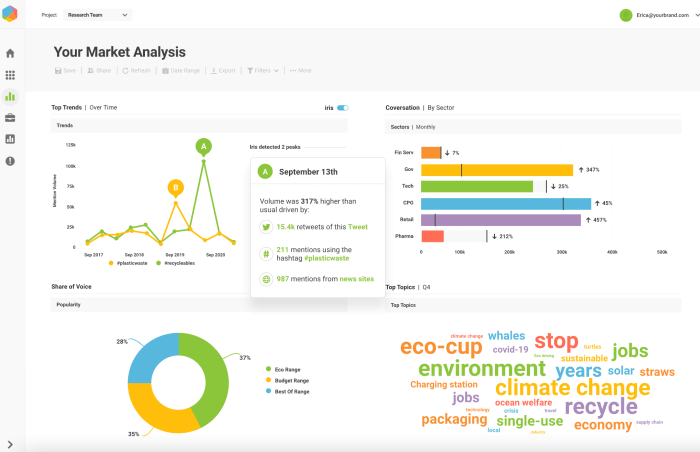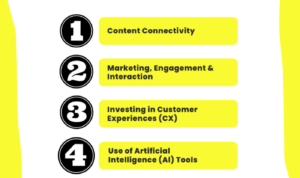Using Social Listening Tools opens up a world of opportunities for businesses to stay ahead of the game and understand their audience better. From monitoring competitors to enhancing brand reputation, these tools are a game-changer in the digital landscape.
In this digital age, harnessing the power of social listening tools can provide valuable insights that drive strategic decisions and boost overall success.
Importance of Social Listening Tools
Social listening tools have become essential for businesses in today’s digital age. These tools allow companies to monitor online conversations, analyze trends, and gather valuable insights to make informed decisions.
Enhancing Customer Engagement
Social listening tools enable businesses to track mentions of their brand, products, or services in real-time. By actively listening to what customers are saying on social media platforms, companies can engage with their audience, address concerns, and build stronger relationships.
Competitive Analysis, Using Social Listening Tools
By using social listening tools, businesses can also keep an eye on their competitors. They can analyze competitor strategies, identify opportunities, and stay ahead of industry trends to maintain a competitive edge.
Improving Products and Services
Through social listening, companies can gather feedback from customers about their products and services. This valuable information can be used to make improvements, launch new offerings, or tailor marketing campaigns to better meet customer needs.
Brand Reputation Management
Social listening tools play a crucial role in brand reputation management. Businesses can quickly address negative feedback or crisis situations before they escalate, preserving their brand image and maintaining customer trust.
Types of Social Listening Tools

Social listening tools come in various types, each offering unique features to help businesses monitor and analyze online conversations. Let’s explore some of the popular types of social listening tools available in the market.
Sentiment Analysis Tools
Sentiment analysis tools are designed to gauge the sentiment or tone of online conversations surrounding a brand, product, or topic. These tools use natural language processing to determine whether mentions are positive, negative, or neutral. Popular sentiment analysis tools include Brandwatch, Talkwalker, and Sprout Social.
Tracking Tools
tracking tools allow businesses to monitor specific s or phrases relevant to their industry. These tools help companies identify trends, track competitors, and discover new opportunities for engagement. Examples of tracking tools include Mention, Awario, and SEMrush.
Influencer Identification Tools
Influencer identification tools help businesses identify key influencers in their industry who can help amplify their message and reach a larger audience. These tools analyze social media profiles to determine an influencer’s reach, engagement rate, and relevance to a brand. Popular influencer identification tools include Upfluence, Traackr, and NeoReach.
Social Media Monitoring Tools
Social media monitoring tools allow businesses to track mentions, comments, and conversations across various social media platforms. These tools provide valuable insights into customer feedback, brand reputation, and industry trends. Examples of social media monitoring tools include Hootsuite, Buffer, and Sprout Social.
Competitor Analysis Tools
Competitor analysis tools help businesses track their competitors’ online activities, strategies, and performance metrics. These tools provide insights into competitor strengths and weaknesses, allowing businesses to adjust their own strategies accordingly. Popular competitor analysis tools include Socialbakers, Rival IQ, and Brand24.
Industry-specific Tools
Certain industries can benefit from specialized social listening tools tailored to their unique needs. For example, e-commerce businesses may use tools like Shopify Compass to track customer sentiment and shopping trends, while healthcare organizations can leverage tools like Symplur to monitor patient conversations and industry news.
Strategies for Effective Social Listening: Using Social Listening Tools

Effective social listening involves more than just monitoring conversations online. It requires a strategic approach to gather valuable insights and leverage them for business growth. Here are some best practices for setting up social listening strategies:
Monitor Competitors
- Identify key competitors in your industry and track their social media activities.
- Analyze their content, engagement levels, and audience sentiments to understand their strategies.
- Use social listening tools to compare your brand’s performance against competitors and identify areas for improvement.
Real-Time Engagement
- Stay alert and respond promptly to customer queries, comments, and feedback on social media platforms.
- Use social listening tools to monitor conversations in real-time and engage with your audience effectively.
- Address customer concerns, provide solutions, and show appreciation for positive feedback to build brand loyalty.
Analyzing Data from Social Listening Tools
When it comes to analyzing data gathered from social listening tools, it’s essential to look beyond the surface numbers and metrics. Businesses need to dive deeper into the insights provided to truly understand their audience and market trends.
Interpreting Social Listening Data
Interpreting social listening data involves not just looking at the volume of mentions or engagement, but also understanding the context behind the conversations. By analyzing the tone, s, and trends, businesses can uncover valuable insights that inform their strategies.
Actionable Insights from Social Listening Data
- Identifying emerging trends and topics in the industry to stay ahead of the competition.
- Understanding customer sentiment towards products and services to improve offerings.
- Monitoring brand reputation and addressing any negative feedback promptly.
- Identifying key influencers and advocates to collaborate with for marketing campaigns.
Role of Sentiment Analysis
Sentiment analysis plays a crucial role in understanding customer feedback through social listening. By categorizing mentions as positive, negative, or neutral, businesses can gauge overall sentiment towards their brand and products. This helps in identifying areas for improvement and addressing customer concerns effectively.




